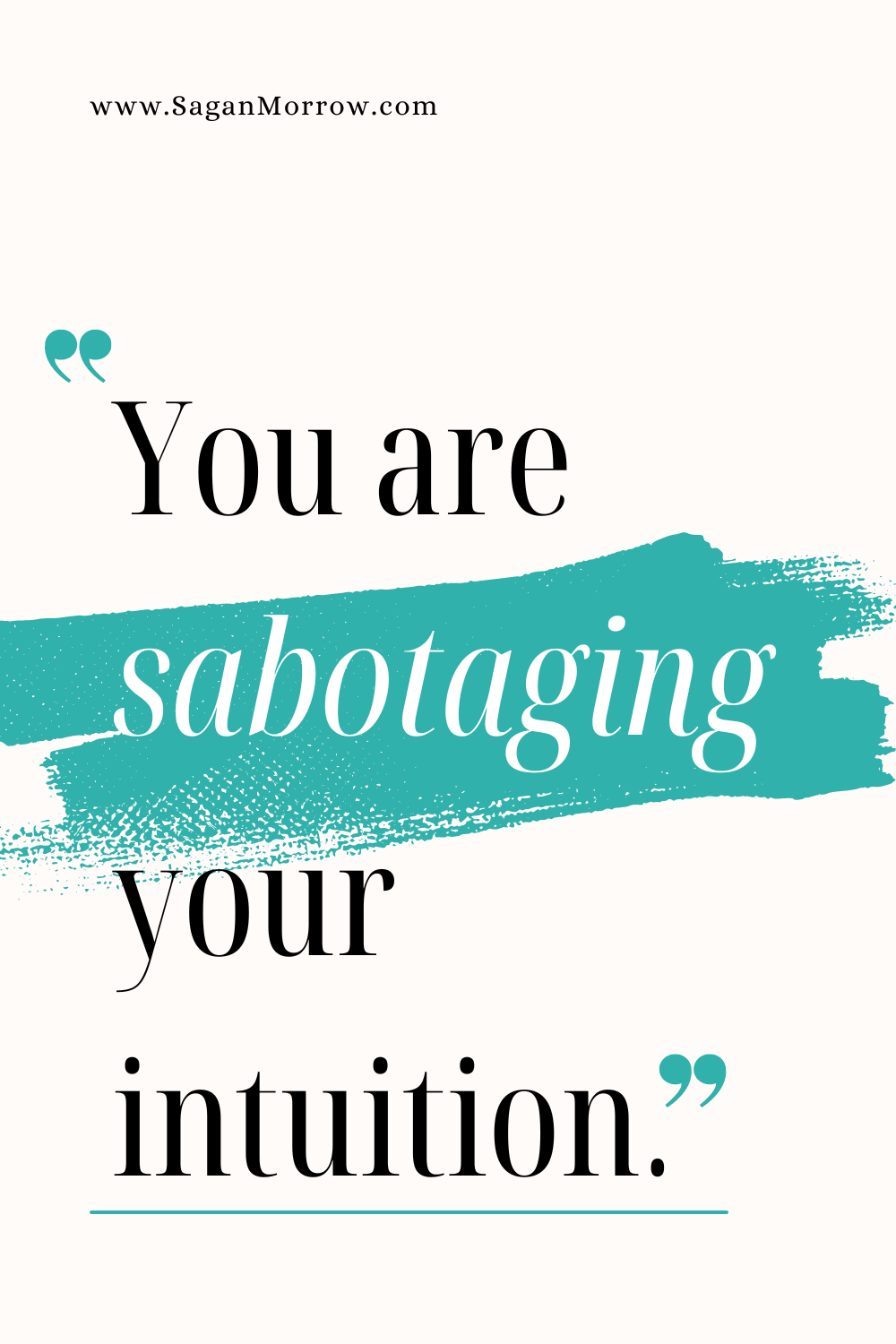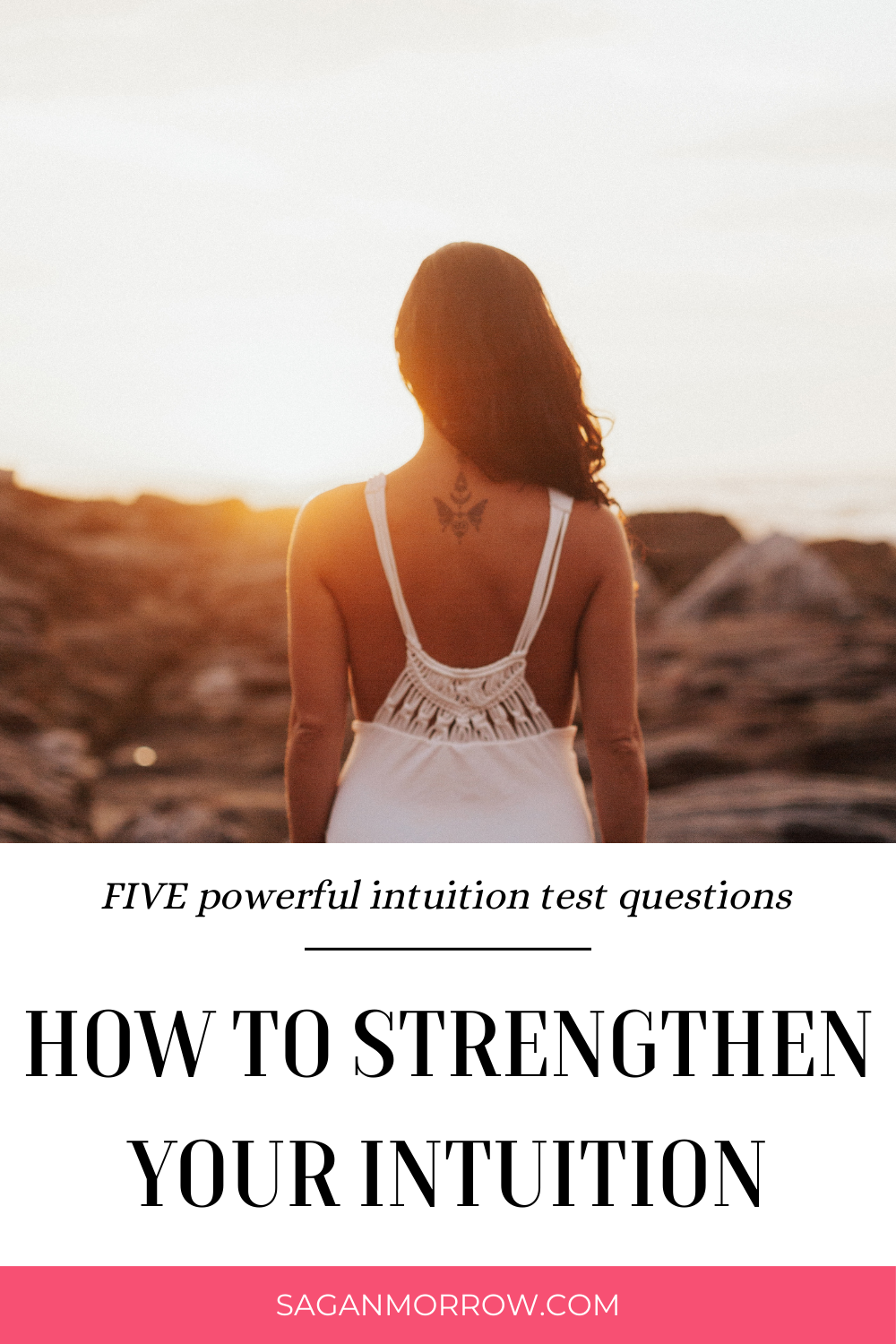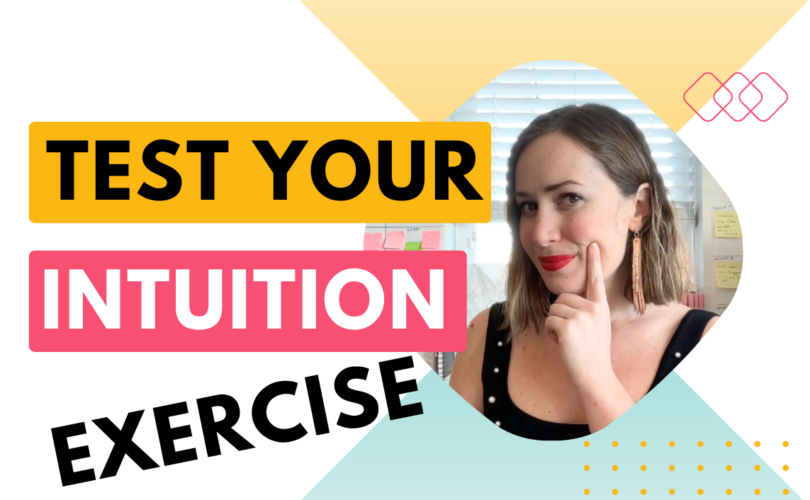Do you often second-guess your decisions? Do you struggle to determine whether you're on the right path in life? Are you afraid to take certain actions because you're worried about making a mistake? Do you listen to other people more than you listen to yourself?
If you said YES to any of those questions, then it is time to activate your intuition!
(As a Personal Fulfillment Coach, I work with many clients to overcome these exact problems. You're in good hands!)
In this video, we're going to explore an assessment of your intuition and how you can be more intuitive so that outside forces or self doubt won't get in the way of you living your best life.
Here's the Test Your Intuition exercise…
We have five questions and then we're going to tally them up at the end — grab a pen and paper so you can keep track of your answers!
(Need more background on this topic? Read the What Is Intuition? article)
1) When you look at the most recent major decisions that you have made in your life, regardless of whether you've asked other people for their input, did you make your decision (or did you know what you wanted to do) BEFORE you asked other people for their input?
Yes, no or unsure.
A few examples of this include moving across the country, ending a relationship, starting your own business, buying a house, etc. Now, these don't need to be big things to other people. They just need to be major to you. So for example, maybe painting a room or chopping off all your hair is a really big deal to you, and in that case it totally counts towards our purposes for today.
Think of this question perhaps in terms of the most recent three big-ish decisions that you have made.
So again, the question is this: When you have made that major decision, did you already essentially make that decision — did you already know what you wanted to do — before you asked other people for their input?
Yes, no or unsure? Write that down.
2) Did you stick with the decision that you made (vs, did you waffle or maybe even backtrack on your decision when you started considering other people's perspectives and their input, or if you started overthinking about society's expectations of you)?
Yes, no or unsure: Yes, you stuck with the decision that you made. No, you ended up waffling or backtracking based on other people's input or based on society's expectations. Or unsure, you're not really sure what exactly you did.
For example, maybe you thought to yourself, “Moving across the country feels right. I want to do it, deep in my bones. And that person over there, that friend, that family member, they have a good point about how I won't know anyone in my new city. And yes, that feels a little scary, but I still really want to do it. I believe in my ability to make new friends. I feel a pull to this place, and I'm going to keep moving forward and do this.”
That type of response indicates that you are sticking with your decision.
Whereas the opposite of that might be, “I really want to move across the country. I feel a pull to this new city. I know that I can do it. But this friend or family member is telling me that I probably will have a really hard time and it's a really big leap, and do I really want to do it? And now I'm thinking maybe I shouldn't do it, even though I really really want to.”
In that case, then your answer to this question would be no: You're not sticking with your decision.
3) How often would you say that you know what it is that you want, when it comes to big picture decisions, big picture things?
Think of this in terms of percentage. For example, 30% of the time, do you know what it is that you want from your life? Are you certain, do you have that deep inner knowing of major decisions? Or is it 90% of the time? Somewhere in between? Is it more or less?
Choose a percentage, and you can think back to maybe the most recent 6 or 10 major decisions that you've made and base your percentage on that.

Why we’re focusing on larger-scale decisions to assess your intuition
I want to note here that we're talking about major decisions, bigger picture types of decisions, and there is a reason for that: Assessing your intuition is really good to do for larger scale types of things, those things that are going to have the biggest impact on you — because the smaller, everyday types of things tend to have less of a stake in them.
For example, if you are at a coffee shop and you can't decide between getting an Americano versus a regular cup of coffee, that might just be because of decision fatigue. You might just be overloaded that particular day. Or you might just be stuck in indecision because you have to make so many other decisions in your everyday life.
In that case, there's less at stake. So your intuition might actually be taking a rest for those types of things. It might be taking a break.
That's why we want to assess your intuition based on larger scale types of things. Your intuition is going to be more finely tuned and finely honed for the larger scale things — and that's why we want to focus on those bigger decisions when it comes to assessing your current intuition levels.
If you're struggling to determine the best course of action when it comes to those big picture, major things in your life, then just know that all of that connects directly to your intuition.
4) Do you typically trust the internal decisions that you make? (E.g. Do you typically experience more butterflies or nervousness, rather than outright fears or self doubt?)
Yes, no or unsure.
For example, if your thought tends to be, “What if I'm making a horrible mistake with this decision?”, then that indicates a lack of self trust. Your intuition may be experiencing some self sabotage.
Or, the other thing that might be happening here is that you aren't sure which voice within you is your intuition. You might be mixing up those voices within yourself. You might not be sure: “Is this intuition, or is this self doubt?”
If you often aren't sure which is the best voice to listen to, if you have a couple of different voices within you and you're not sure which one is your intuition, then your answer to this question will be no. So write that down on your paper.
5) Do you typically only use reasoning tools (such as a pros and cons list) as a final confirmation of a decision, rather than needing to logically process everything?
Yes, no, or unsure?
For example, your thought might be, “I have been house hunting. I definitely want to buy this particular house. I am drawn to it. It feels so right. The vibe is right, the energy is right, everything about it is so attractive. This is 100% the house for me — and now I'm just going to do my due diligence by getting the house inspector to take a look at it.”
That type of thought is very different from this thought: “I don't know if this is the right house, but it's here. So I'll get an inspection and if it all looks good, then I guess we'll get it.”
In that case, are you really going to be fulfilled and satisfied with this house? What if you instead explored your uncertainty a little further?
Another thought that might be going on for you is this: “I can't decide between these two houses, but I know that other people are interested in them. So I'm just going to wait and see which house goes first. If someone else buys that one house, then I'll just take the other one by default. That's the one I’ll buy, by default.”
In that case, you're letting other people make the decision for you, and you're not trusting your intuition. So your answer to this question, again, would be no.

Assess your intuition levels: Tally up your answers to get your results!
All right: Tally it up! How many Yes, No, or Unsures did you get?
If you got ANY answers that were No or Unsure to those four questions, then you can benefit from tapping more deeply into your intuition and developing your intuition further.
For question #3, when we talked about the percentage of time that you trust that intuition, if you've got less than 80%, then you can absolutely develop your intuition further. Really, if you've got less than 100%, then you can absolutely fine tune your intuition! But if it's less than 80%, then your intuition really needs that extra strengthening.
How to develop your intuition…
Your next step is to actually develop your intuition. And you're in luck: You can get into intuitive alignment with my Intuition Activated masterclass!
It's a brand-new, free class that I am teaching live in just a couple of weeks. This intuition masterclass includes some fun intuition exercises, plus situations specific examples for how you can develop your intuition at a deeper level.
It is going to be so good, so valuable, so actionable for you, and it's really going to help you with developing that intuition muscle.
(And if you're watching this video/reading this article in the future, AFTER I've taught it live… You're in luck! The replay is available when you register. Enjoy!)
